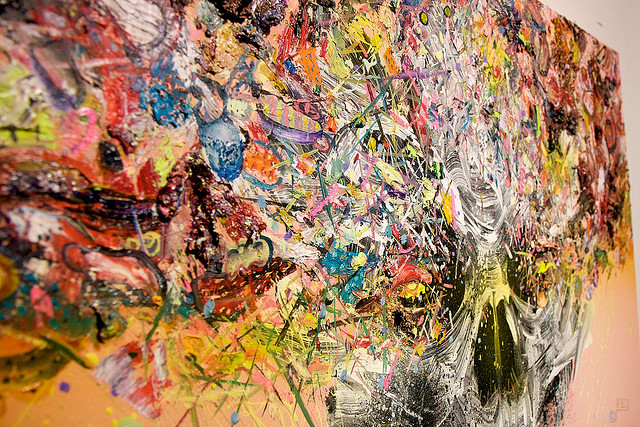
May 3, 2013, by Stephen Pihlaja
Transgression
The Korean-American graffiti artist David Choe is, perhaps, most well-known now for being a Facebook millionaire, one of the people who were given stock in lieu of cash for work done for the company. In Choe’s case, he painted a mural at the Facebook headquarters in 2005 and instead of taking USD$60,000, he was given a small stake in the company. When the IPO went public last year, the stock was rumoured to be worth over USD$200 million.
But never mind that for now: Choe is first and foremost a graffiti artist (and a very talented one) with a love for travel. Choe talks quite a bit about how he is particularly drawn to developing countries for their lack of order and the new perspectives they afford. Given his lifestyle, however, he frequently got into trouble with the law when he was younger, and in 2003, spent time in Japanese prison for punching a plain-clothes security guard. Trangression, for Choe, is not just about painting buildings he’s not supposed to, but living in a way that rejects social power structures.
Anyway, over the last week, I was watching a TV show that Choe did for the TV channel Vice, called ‘Thumbs Up‘, in which he hitch-hikes around the US and China. Of course, what would a reality TV show about one of the world’s most famous graffiti artists be without some graffiti. One scene in particular was fascinating to watch:
Choe is somewhere south of Beijing and starts to do graffiti on a wall in broad daylight on a moderately busy street. As he is painting, a crowd gathers and an older man comes up to him, saying in Chinese, ‘You can’t do that! You can’t do that!’ Choe doesn’t speak Chinese or appear to care what the man is saying, but instead continues to paint (the crowd growing and the man continuing to tell him to stop). An amazing mural emerges and Choe finishes and walks away — the crowd of locals gaping at the mural and the scene they just witnessed.
I ended up telling my older brother (who’s spent time in India) about the show, and we went back and forth about both the medium of graffiti as an art form — it is, by nature, transgressive — and Choe’s general attitude while travelling around China. After I told my brother about this particular scene, he said, ‘I’m incredibly uncomfortable with the notion of a westerner using “Asia” as a playground for their fantasies.’ Indeed, part of the show’s draw is Choe’s lack of respect and concern for the consequences of his actions. ‘Transgression’ is the whole point, but transgression is often profoundly selfish. Choe’s art is about him expressing himself in his own terms, regardless of whom it affects.
Still, I was left thinking two things:
First, for as ‘transgressive’ as Choe’s actions are, they are also still sanctioned and supported by certain power structures, notably the TV channel paying him to do the show and the rich, famous, and powerful people —including the White House — that serve as his patrons. In interviews, Choe laments now being asked to ‘tag’ buildings: it’s not, of course, transgressive art if you’ve been invited to do it. In this way, the popular culture swallowed up Choe’s transgressive voice, and now idolises and celebrates it. The cultural theorist Stuart Hall’s article ‘Notes on Deconstructing the Popular‘ is worth reading on this point.
Second, and perhaps more relevant, I thought about my brother’s comment, rejecting Choe’s actions as treating Asia as a ‘playground for [Western] fantasies’. I wondered what Western action in Asia would not be playing out a fantasy in some way, a suitable verb at the end of the sentence ‘I came to the East to…’ As I try to fill in that sentence —’teach’, ‘work’, ‘live’ — I can’t think of anything that doesn’t entail, in some way, an orientation to my own desire, my own ‘fantasy’. I’m not tagging the Great Wall of China, certainly, but am I doing anything more positive?
There’s no easy answer to this, I don’t think, but I do think we need people like Choe (in China and the States and everywhere) to transgress publicly and draw our attention to what we prohibit and why we say you can do some things, but not others. Choe points to a wall in a subway and says, ‘Why can’t I paint on that?’ The answer, it turns out, is more complicated than you think.
Dr Stephen Pihlaja is Assistant Professor of Language and Literature in the School of English at the University of Nottingham Malaysia Campus. He blogs more regularly at Take, Take, Take.
Image used under Creative Commons License from fresh888

Very nicely written piece here. Glad to have stumbled upon your blog. I was searching for articles on David Choe when I came across this.
Thank you on behalf of Stephen, who has left us for another university! -Woon Chin